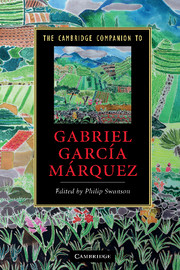Book contents
- Frontmatter
- Introduction
- 1 Gabriel García Márquez: life and times
- 2 The critical reception of García Márquez
- 3 Before One Hundred Years of Solitude: the early novels
- 4 One Hundred Years of Solitude
- 5 An eco-critical reading of One Hundred Years of Solitude
- 6 The Autumn of the Patriarch
- 7 The General in His Labyrinth
- 8 García Márquez’s novels of love
- 9 García Márquez’s short stories
- 10 García Márquez’s non-fiction works
- 11 García Márquez and film
- 12 García Márquez, magical realism and world literature
- Further reading
- Index
6 - The Autumn of the Patriarch
Published online by Cambridge University Press: 28 September 2010
- Frontmatter
- Introduction
- 1 Gabriel García Márquez: life and times
- 2 The critical reception of García Márquez
- 3 Before One Hundred Years of Solitude: the early novels
- 4 One Hundred Years of Solitude
- 5 An eco-critical reading of One Hundred Years of Solitude
- 6 The Autumn of the Patriarch
- 7 The General in His Labyrinth
- 8 García Márquez’s novels of love
- 9 García Márquez’s short stories
- 10 García Márquez’s non-fiction works
- 11 García Márquez and film
- 12 García Márquez, magical realism and world literature
- Further reading
- Index
Summary
The Autumn of the Patriarch (El otoño del patriarca, 1975) is a text as robustly resistant to confident evaluation as any other by García Márquez, who described it as 'a poem on the solitude of power', a 'poetic adventure' and a highly personal 'book of confession'. Reminiscing with Plinio Apuleyo Mendoza, he situates his intuition of the mystery of power in a scene he witnesses as a reporter in Caracas in 1958 just after the fall of General Marcos Pérez Jiménez: “It was nearly four in the morning, when the door opened and we saw an officer, in combat gear, walking backwards, with muddy boots and a sub-machine gun in his hands . . . pointing with the machine gun, and dirtying the carpet with the mud from his boots. He went down the stairs, got into a car which took him to the airport, and went into exile. It was at that precise moment, when that soldier was leaving a room where the formation of the new government was being decided, that I had the intuition of power, the mystery of power.” / Power is a glass ball in the palm of one's hand, but it may also be a slippery fish 'swimming around without god or law' ('un sábalo vivo que nadaba sin dios ni ley'). The initial inspiration for the aesthetic of The Autumn of the Patriarch was 'the image of an inconceivably old dictator who ends up alone in a palace full of cows'.
- Type
- Chapter
- Information
- The Cambridge Companion to Gabriel García Márquez , pp. 78 - 93Publisher: Cambridge University PressPrint publication year: 2010
- 1
- Cited by

